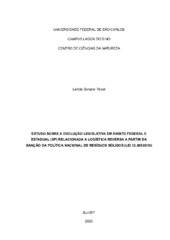| dc.contributor.author | Rossi, Letícia Borsato | |
| dc.date.accessioned | 2023-04-17T19:10:52Z | |
| dc.date.available | 2023-04-17T19:10:52Z | |
| dc.date.issued | 2023-03-08 | |
| dc.identifier.citation | ROSSI, Letícia Borsato. Estudo sobre a evolução legislativa em âmbito federal e estadual (SP) relacionada a logística reversa a partir da sanção da política nacional de resíduos sólidos (Lei 12.305/2010). 2023. Trabalho de Conclusão de Curso (Graduação em Engenharia Ambiental) – Universidade Federal de São Carlos, Lagoa do Sino, 2023. Disponível em: https://repositorio.ufscar.br/handle/ufscar/17781. | * |
| dc.identifier.uri | https://repositorio.ufscar.br/handle/ufscar/17781 | |
| dc.description.abstract | One of the environmental problems that has gained prominence is the immense
amount of waste produced by the population. In Brazil, discussions related to this
theme gained intensity with the publication of Law n° 12.305/2010, which recognized
the implementation of Reverse Logistics as a fundamental instrument for the
management of solid waste. This study aims to analysis based on the National Solid
Waste Policy established by Law n˚ 12.305/2010 and the national and state
legislative evolution that underlies the exercise of reverse logistics in Brazil and the
State of São Paulo (SP), in addition to mapping the main challenges faced in the
implementation of RL in Brazil and expose the innovations proposed by the
legislature. For this study, a bibliographical research and analysis of secondary data
were carried out, access to documents was obtained through databases and online
libraries. The results indicate the existence of a series of challenges, these
distributed in three categories, related to political/legal, operational and social
aspects. In addition, the PNRS is innovative, as it establishes a hierarchical order
prioritizing the non-generation and reduction of waste, establishing shared
responsibility for the life cycle of products, in addition to recognizing the importance
of collectors of recyclable materials as a fundamental element in waste management.
In view of the above, it is concluded that the objectives proposed in this work were
achieved, allowing the listing of standards that deal with Reverse Logistics, in
addition to carrying out a survey of the challenges faced for the implementation of
Reverse Logistics Systems in Brazil and finally brought the innovative points
established by the exposed guidelines. In this sense, this work ends by raising
numerous points that need to advance in the current debate on reverse logistics and
also identifying the need to complement the PNRS. | por |
| dc.description.sponsorship | Não recebi financiamento | por |
| dc.language.iso | por | por |
| dc.publisher | Universidade Federal de São Carlos | por |
| dc.rights | Attribution-NonCommercial-NoDerivs 3.0 Brazil | * |
| dc.rights.uri | http://creativecommons.org/licenses/by-nc-nd/3.0/br/ | * |
| dc.subject | Logística reversa | por |
| dc.subject | Resíduos sólidos | por |
| dc.subject | Gerenciamento de resíduos | por |
| dc.subject | Ciclo de vida | por |
| dc.subject | Reverse logistics | eng |
| dc.subject | Solid waste | eng |
| dc.subject | Waste management | eng |
| dc.subject | Life cycle | eng |
| dc.title | Estudo sobre a evolução legislativa em âmbito federal e estadual (SP) relacionada a logística reversa a partir da sanção da política nacional de resíduos sólidos (Lei 12.305/2010) | por |
| dc.title.alternative | Study on the legislative evolution at the federal and state level (SP) related to reverse logistics from the sanction of the national solid waste policy (Law 12.305/2010) | por |
| dc.type | TCC | por |
| dc.contributor.advisor1 | Tiezzi, Rafael de Oliveira | |
| dc.contributor.advisor1Lattes | http://lattes.cnpq.br/7979063304544915 | por |
| dc.description.resumo | Um dos problemas, na área ambiental, que tem ganhado destaque é a imensa
quantidade de resíduos produzidos pela população. No Brasil, as discussões
relacionadas a essa temática ganharam intensidade com a publicação da Lei n°
12.305/2010 que reconheceu a implementação da Logística Reversa (LR) como
instrumento fundamental para o gerenciamento de resíduos sólidos. Este estudo tem
como finalidade realizar uma análise a partir da Política Nacional de Resíduos
Sólidos instituída pela Lei n˚ 12.305/2010 e a evolução legislativa nacional e
estadual que fundamenta o exercício da logística reversa no Brasil e Estado de São
Paulo (SP), além disso irá apresentar ementas que fundamentam o exercício da
logística reversa, mapear os principais desafios enfrentados na implementação da
LR no Brasil e expor as inovações propostas pelo legislativo. Para este estudo, foi
realizada uma pesquisa bibliográfica e análise de dados secundários, o acesso aos
documentos foi obtido por meio de bancos de dados e bibliotecas online. Os
resultados indicam a existência de uma série de desafios, estes distribuídos em três
categorias, relacionadas aos aspectos políticos/legais, operacionais e sociais. Além
disso, a PNRS se mostra inovadora, pois estabelece uma ordem hierárquica
priorizando a não geração e redução na geração de resíduos, institui a
responsabilidade compartilhada pelo ciclo de vida de produtos, além de reconhecer
a importância dos catadores de materiais recicláveis como elemento fundamental na
gestão de resíduos. Diante do exposto, conclui-se que os objetivos propostos neste
trabalho foram alcançados, permitindo a listagem das normas que versam sobre
Logística Reversa, além de realizar um levantamento dos desafios enfrentados para
a implementação de Sistemas de Logística Reversa no Brasil e por fim trouxe os
pontos inovadores estabelecidos pelas diretrizes expostas. Nesse sentido, este
trabalho se encerra levantando inúmeros pontos que precisam avançar no debate
atual sobre logística reversa e identificando ainda a necessidade de
complementação da PNRS. | por |
| dc.publisher.initials | UFSCar | por |
| dc.subject.cnpq | ENGENHARIAS::ENGENHARIA SANITARIA::SANEAMENTO AMBIENTAL | por |
| dc.subject.cnpq | ENGENHARIAS::ENGENHARIA SANITARIA | por |
| dc.publisher.address | Câmpus Lagoa do Sino | por |
| dc.publisher.course | Engenharia Ambiental - EAm-LS | por |

